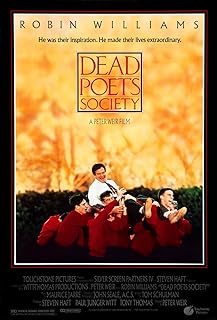電影訊息
電影評論更多影評

2012-03-16 00:12:41
Growing Pain
Dead Poets' Society. If it hadn't been for class requirement, I must have missed this great lecture on life. Some might like to narrow down the theme to something more loyal to the original film, that is, carpe diem and puberty education. But I insist that there is more behind the spotlight, which is identified as growing pain.
In fact, despite the "Society", there has been many other movies revolving upon growing pain. For example, Juno. But none dissects the pain with such lucidity that every audience gets to empathize with the characters, that every watcher can spot him/herself on the screen. How did they do it? By deliberately splitting the complicated dispositions into different characters--the boys.
It's really hard to tell which one in the boys' group is the main character that can overshadow the rest. Every boy is remembered in the end, because of their distinguished characteristics. But by the final scene, where Todd slowly rose up to his desk and said "O'Captain, my Captain" with tears in eyes, I'm convinced that this seemingly placid boy is the real core of the whole movie.
Todd admires Neil's dream to act and his hot-headed passion. Todd is pleased by Knox's puppy love for Chris and his headlong courage. Todd feels hesitated about Cameron's solemnity toward study and his cool-headed analysis. Todd is disappointed at Charlie's disciplinary offense and his headstrong rebellion. It's so easy to keep our eyes glued to any of those guys with sharp characteristics and with every part of soul oozing with energy. While Todd merely retreats into a boy who doesn't read poems in the society, who loves Prof. Keating's class so much but not knowing how to express his attentiveness, who falls into pieces after Neil's death. But what counts more is that Todd is the one who can truly reveals the process of growing up.
Growing up, no one can deny the existence of the crucial pain behind it. Not only that in body, but more at heart. I believe that the four guys each reveals one aspect of the most common growing pains during puberty years. Neil stands for the longing for ideal career. Knox, obviously, represents the longing for love. Charlie and Cameron show the opposed two general attitudes toward school life, rebel against it or conform to it. Of course, for a movie, it has its dramatic way to present the four aspect, like Knox's infactuation at first sight, like Charlie's fake phone call, like Cameron's snitch. Even melodramatic, like Neil's unexpected but sensible suicide. Many of my classmates consider that a blunder in the movie and glooms the whole story. But we have to acknowledge that the best way to get audience involve in a movie is to amuse them or hurt them. And usually, hurt works better than entertainment. That's why Neil has to shots away his own life. Besides, to dramatize the whole settings, the director has to pull the trigger and go to extreme.
Technically, the plot settings that Neil commits suicide and Charlie gets lashed are the very point that connects him with us. It's like we are tucked back into our youth and live inside the boys. The bullet would blow our head up. The lash would tear our back open.
What should we choose? Our position is exactly the same as Todd, for he stands for all of us ordinary school kids. And Todd chooses to live on but from a different angle to look at things. He chooses to stand on the desk and salute to his respected teacher, Prof. Keating. This is not an affected imitation to salute to Prof. Keating and his "carpe diem", but a welcome to the first decision he ever made to be himself. Carpe diem is not a mere slogan raised by Keating. It is the way to live life. As a matter of fact, I guess, everyone has got the message and thus the different "carpe diem" ignites the conflict between characters. After all, you can't make everyone Keating but you can make yourself you.
評論

